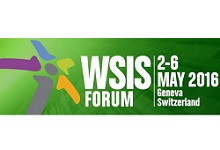Towards building effective partnerships for sustainable management of e-waste
5 May 2016 16:45h
Event report
[Read more session reports and live updates from the WSIS Forum 2016.]
This session addressed the challenges related to e-waste management and the efforts made by different UN agencies to promote the sustainable management of e-waste worldwide.
Mr Malcolm Johnson (Deputy Secretary-General, ITU) opened the session and highlighted the importance of the responsible management of e-waste. He explained the connections between e-waste management and the sustainable development goals (SDGs), the WSIS Action Lines, and the ITU’s 2020 Agenda. He furthermore introduced the initiatives taken by the ITU to promote sustainable e-waste management and stressed the need to work together among different UN agencies and with other actors, in particular industry, ‘to rid the planet of this scourge’.
Moderator Ms Cristina Bueti (Advisor, ITU) then introduced the panellists. The first to speak was Ms Francesca Cenni (Programme Officer, Basel Convention Secretariat). She outlined the challenges of hazardous e-waste, particularly regarding the involvement of the informal sector (only 15% of e-waste is formally recycled) and challenges related to the funding mechanisms that incentivise producers to ‘burn and dump’ the waste. She also explained how the Basel Convention tries to tackle the issue of hazardous e-waste, focusing on its transboundary movement and illegal traffic.
Ms Maria Neira (Director, Department of Public Health, Environment and Social Determinants of Health, WHO) focused on one particular challenge: the consequences of e-waste for human health. Systematic studies by WHO found that exposure to e-waste has significant consequences for the health of the vulnerable populations working in the informal e-waste recycling sector, and children in particular. She underlined the importance of raising awareness among the affected populations and the larger public, developing the capacity and tools of the health sector, conducting research on e-waste, and interacting with relevant stakeholders.
Mr David Seligson (Head of Manufacturing, Mining and Energy Unit, ILO) talked about the labour-related challenges and opportunities of e-waste. On the one hand, e-waste management is often conducted under poor working conditions. On the other hand, the growing need for sustainable e-waste management can create labour opportunities. The ILO is promoting standards and principles, and encourages the formalisation of the sector to improve working conditions and create sustainable employment.
Mr Alejandro Roca Campana (Senior Director, Access to Information and Knowledge Division, Global Infrastructure Sector, WIPO) addressed the intellectual property (IP) approach to e-waste. He presented the Patent Landscape Report on E-Waste Recycling, which addresses the innovation and patenting trends in e-waste management.
Mr Klaus Tyrkko (Chief of the Stockholm Convention Division, Department of Environment, UNIDO) focused on the more practical ways of establishing sustainable e-waste management systems and the ways in which the United Nations Industrial Development Organization (UNIDO) attempts to promote them. He concluded by elucidating the complexity of e-waste flows, their many different dimensions, and the resulting need for cooperation between disciplines, agencies and sectors.
The Q&A focused on e-waste management in African countries and in the Caribbean. Furthermore, the need to cooperate with universities and engage in academic networks was highlighted.
Finally, Bueti presented a new report entitled Sustainable management of waste electrical and electronic equipment in Latin America, which is a collaborative effort of different UN Agencies and is available in English and Spanish.
The full presentations of the different speakers can be found here.
By Barbara Rosen Jacobson
Related topics
Related event

